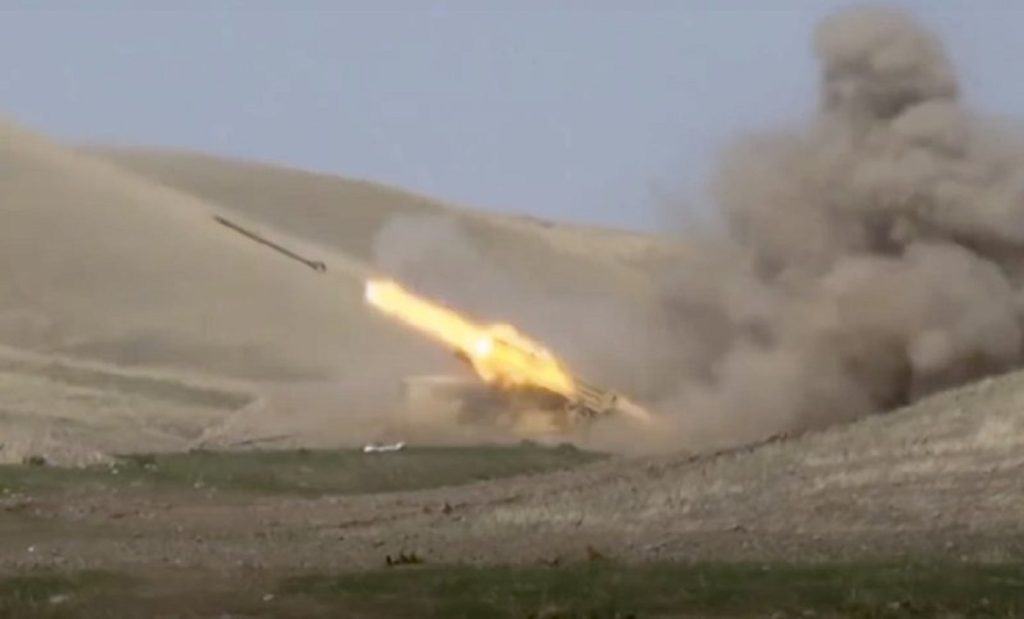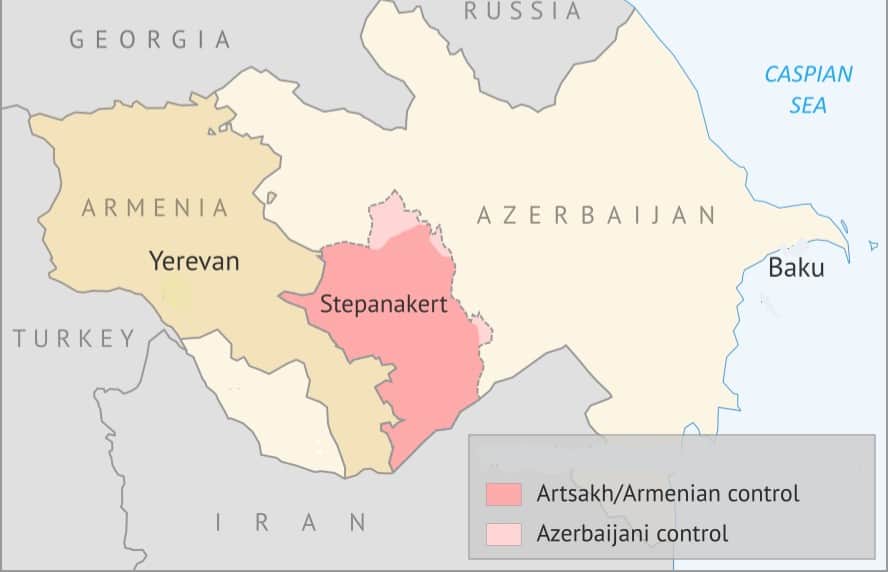By Nikola Mikovic
Positional warfare between Turkey-backed Azerbaijan and Armenia-sponsored Artsakh forces rages on. Fierce battles for control over the disputed territory of Nagorno-Karabakh, also known as Artsakh, have already resulted in dozens, if not hundreds of dead troops on both sides. Is the turbulent Caucasus region on the edge of the wide-scale war?
The conflict could have grave repercussions for the entire Caucasus, especially if foreign powers such as Turkey, Russia and Iran directly involve in the war that erupted on September 27 after Azerbaijani forces reportedly attacked Nagorno-Karabakh – internationally recognized as part of Azerbaijan, but de facto independent state with an Armenian ethnic majority. Ever since, both Yerevan and Baku have declared martial law and general mobilization.
However, so far the main hostilities have been localized on the territory of Arsakh, although there were reports of sporadic and rare shelling within the borders of Armenia and Azerbaijan, as well as alleged drone attacks around Yerevan. Also, according to Iranian reports, during heavy clashes several rockets landed in Iranian villages near the line-of-contact between Azerbaijan and Nagorno-Karabakh.
The Armenia – Azerbaijan conflict threatens to destabilize Iran as well, since violent protests were held in Iran’s East Azerbaijan province where ethnic Azeris form the majority of the population. Even though Tehran is officially taking no sides in this war, the Islamic Republic recently reportedly shot down an Azerbaijani drone that entered its territory, and allegedly allowed the passage of Russian weapons bound for Armenia.
Regardless of the fact that both Iran and Azerbaijan are Muslim countries with the majority of Shiia population, Tehran is indirectly sided with Christian Armenia as it aims to prevent Baku’s main ally Turkey from creating another Syria on Iran’s borders. However, the religious aspect of this conflict is not of a crucial importance, even though Turkey is reportedly transferring its proxy Islamist militants from Libya and Syria to Azerbaijan to fight in Nagorno-Karabakh. In spite of harsh religious rhetoric, Ankara’s goal in the Caucasus is mostly related to economy.
Azerbaijan is the most important Turkey’s partner in the Caucasus and Ankara remains one of the most important buyers of the Azeri energy. It is worth noting that key energy corridors that carry crude oil and natural gas from the former Soviet republic westward both pass near the disputed Nagorno-Karabakh region. In order to ensure flawless energy supplies, and also to reduce its dependency on Russian gas, Turkey is using Azerbaijan as its proxy in this geopolitical game. In case the Azeri forces manage to eventually capture Arsakh, Russia’s position in the region will be heavily affected both economically and politically.
From the energy perspective, Azerbaijan’s victory could create conditions for realization of plans to bypass Russia by completing Trans-Caspian pipeline, as well as Southern Gas Corridor. In addition, Baku’s control over Nagorno-Karabakh would completely change the status quo on the ground where Russia effectively arms both Armenia and Azerbaijan and maintains good relations with both countries.
Armenia is a member of the Russia-led Collective Security Treaty Organization (CSTO), as well as Eurasian Union, but that does not necessarily mean that Russia will militarily intervene in this conflict. Technically, Azerbaijan is not at war with Armenia, but it is fighting Armenia-backed self-proclaimed Republic of Artsakh, which means that Armenia, as CSTO member-state, has not been attacked. Even if, eventually, Azerbaijan starts massively shelling Armenian towns and cities, it is quite questionable if Russia will defend its ally, as that would involve Moscow in direct confrontation with Baku’s main sponsor – NATO member Turkey. The Kremlin will likely provide more arms to Yerevan, and possibly even deploy private military contractors to the country while Turkey, on the other hand, openly said that it is ready to provide military support to Azerbaijan. Turkish Minister of Foreign Affairs Mevlut Cavusoglu recently emphasized that “ceasefire has no meaning before the Armenian occupation of Nagorno-Karabakh ends”, while Russia called for end of bloodshed and urged for dialogue.
If Baku agrees for a ceasefire without previously capturing significant parts of Artsakh, such a move will be interpreted as its defeat. So far, the Azerbaijani Army did not manage to establish control over any sections of the disputed territory, as Artsakh Defense Forces reportedly repelled all of the Azeri attacks. However, given that Azerbaijan has the upper hand in terms of high-tech military kit, in the long term Armenian forces could suffer heavily loses and the Azeris could eventually break Nagorno-Karabakh defense lines. In that case, Russia and Iran will have a choice – to intervene, or to accept a new reality where Turkish influence in the Caucasus will grow tremendously.
Since Russia and Turkey are enemies and allies at the same time, in the long term they are expected to reach an agreement over the Armenia – Azerbaijan conflict. In the meantime, they will keep selling arms to their client-states in the Caucasus, although there are fears that this proxy conflict could escalate and have grave consequences for the entire region.
Author: Nikola Mikovic (Journalist, researcher and analyst based in Serbia. He covers mostly the foreign policies of Russia, Belarus and Ukraine)
(The views expressed in this article belong to the author and do not necessarily reflect the views of World Geostrategic Insights)
Image Credit: Azerbaijan’s Defense Ministry/AP








